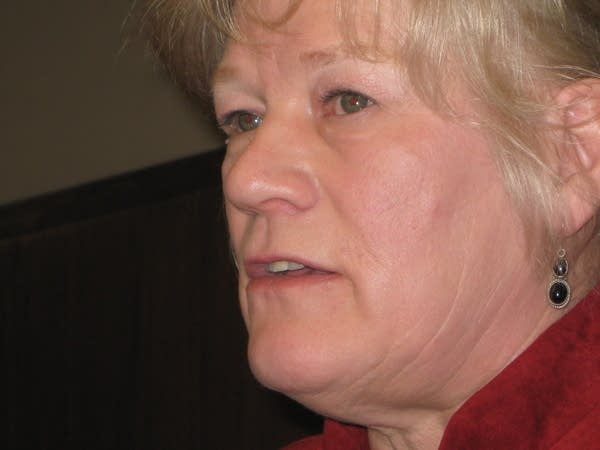Poll: Molnau gets low marks as MnDOT chief
Go Deeper.
Create an account or log in to save stories.
Like this?
Thanks for liking this story! We have added it to a list of your favorite stories.

Six months after the I-35W bridge collapse, Lt. Gov. Carol Molnau's approval ratings are low and DFL legislative leaders are already talking about her in the past tense.
The poll finds that just one in four surveyed approve of Molnau's job performance as Transportation Commissioner. Forty-three percent disapprove of the job she's doing. Nearly one-third of those polled say they don't know.
Dave Stobal, 65, a retiree who lives in Tonka Bay, says he's isn't happy with how Molnau is managing the Transportation Department.

"I do believe that the buck stops at the top, and clearly she's denied any responsibility for what has happened," Stobal said. "And I just don't believe that's the way it should be handled."
Turn Up Your Support
MPR News helps you turn down the noise and build shared understanding. Turn up your support for this public resource and keep trusted journalism accessible to all.
Molnau declined an interview request to respond to the poll. She has been heavily criticized since the 35W bridge collapsed on Aug. 1.
DFL legislative leaders also blame her for financial problems at MnDOT, delays in the Wakota Bridge project and for personnel problems within MnDOT. Several lawmakers have called on her to resign.
Sen. Steve Murphy, DFL-Red Wing, says the Senate will effectively fire her if she doesn't quit.

"It's a foregone conclusion. She's not going to be the commissioner much longer," Murphy said. "And quite frankly, I'm tired of wasting time working on that issue when we have people's livelihoods at stake, and their lives at stake. We need to pass a funding bill. That's the bottom line this year."
"What this poll shows is that MnDOT needs to improve," said Gov. Tim Pawlenty's spokesman Brian McClung.
McClung said the governor will continue to stand by Molnau, but will work on improving the public's perception of the department.
"We understand that Minnesotans want to see improvement at MnDOT, and we certainly take these poll numbers to heart," McClung said.
"If they bring what I call the big-pig [transportation] bill back again, it's going to the slaughterhouse."
Even with the 35W bridge collapse and the attention on roads and bridges, only 8 percent of the 917 people polled say transportation is the most important problem in Minnesota.
The economy and jobs, health care, taxes and education all rank higher in the poll.
The poll also found that those surveyed are evenly split on whether they support a nickel-a-gallon gas tax increase to fund road and bridge projects. Forty-nine percent support it, and 49 percent oppose it. The other 2 percent are undecided.
The poll has a margin of error of plus or minus 3.2 percentage points. A majority of those polled oppose an even higher 10-cent-a-gallon gas tax increase.
Bill Eiffert of St. Cloud said he's against increasing the gas tax because he thinks gas prices are already too high, and is worried that the money won't be spent wisely.
"I don't think the money would go to the right place," Eiffert said.

The poll comes on the eve of the 2008 legislative session, where transportation policy is expected to dominate the discussion.
Last year, the Legislature passed a bill that included a 7.5-cent-a-gallon gas tax increase, a metrowide sales tax increase for transit, and other tax and fee increases for transportation. Pawlenty vetoed the bill and the House failed to override the veto.
House and Senate DFL leaders say they will push for another bill that includes a gas tax increase, a metrowide sales tax increase and other revenue increases for transportation.
DFL House Speaker Margaret Kelliher said she expects a gas tax increase to become law this session.
"I think it will be done bipartisanly, and it will be able to begin to work on the backlog that's out there in our transportation system," Kelliher said. "It will be fair statewide and do a lot of good things -- both in the short term and the long term -- for our state's economic health."
Pawlenty's spokesman Brian McClung cited other polls that show a greater opposition to a 5- cent-a-gallon gas tax increase. That being said, he said the governor is open to a gas tax increase, but only if lawmakers provide another tax cut in exchange.
McClung also said the main sticking point is that Democrats may propose several other transportation-related tax increases which the governor opposes.
The governor has proposed $416 million for transportation funding in his bonding bill.
House Republican Minority Leader Marty Seifert said lawmakers should focus on putting transportation projects in the bonding bill and not raise the gas tax. He said his caucus will uphold Pawlenty's vetoes again if Democrats pass tax increases.
"If they bring what I call the big-pig bill back again, it's going to the slaughterhouse," Seifert said. "And I hope that they can sit down and work out a compromise that the governor can agree to, and actually sign, rather than this controversial partisanship that they'll bring forward that they know the governor objects to."
The legislative session begins on Feb. 12, and DFL legislative leaders say they hope to start work on a transportation bill in the first weeks of the legislative session.
If negotiations fail, it's possible the House could try again to override Gov. Pawlenty's veto of last year's bill.




